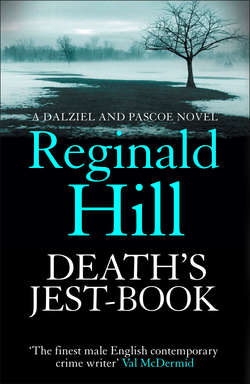Читать книгу Death’s Jest-Book - Reginald Hill - Страница 10
ОглавлениеClifton, Glos, December 1808
Another bedroom, another bed, with another still figure stretched on it, arms crossed on breast, eyes staring sightlessly at the ceiling. But this is no old woman paled into a simulacrum of death by illness and debility. She, by the mercy of God and the ministrations of her doctor, still lives, but now Thomas Beddoes Sr, aged only forty-eight and looking as strong and wilful as ever he did in life, has leapfrogged his ancient patient into the grave.
Two women stand by the bed, one with her face so scored by grief she looks more fit to be laid on a bier than her husband, the other, some years older, with her arm round the wife’s waist, offering comfort.
‘Do not give yourself over so utterly to grief, Anne,’ she urges. ‘Remember the children. You must be their strength now, and they will be yours.’
‘The children … yes, the children,’ says Anne Beddoes distractedly. ‘They must be told … they must be shown and take their farewells …’
‘Not all of them,’ says the other gently. ‘Let Tom do for all. He is a thoughtful child for his age and will know how best to tell the others. Shall I fetch him now, Sister?’
‘Please, yes, if you think it best …’
‘But first his eyes … should we not close his eyes?’
They look down at the strong staring face.
‘The parson tried but could not draw the lids down,’ says Anne. ‘He was in his prime, so full of energy … I do not think he was ready to leave the world he could see for one which is invisible …’
‘It is a great loss, to you, to us all, to the poor of Bristol, to the world of science. Compose yourself a little, Sister, and I will fetch young Tom.’
She leaves the room, but does not have far to go.
Little Thomas Lovell Beddoes is sitting on the top stair, reading a book.
‘Tom, my sweet, you must come with me,’ she says.
The boy looks up and smiles. He likes his Aunt Maria. To the world she is Miss Edgeworth, the famous novelist, and when he told her that one day he too would like to write books, she didn’t mock him but said seriously, ‘And so you shall, Tom, else you would not be your father’s son.’
Also she tells him stories. They are good stories, well structured, but lacking a little of the colour and excitement he already prefers in a narrative. But this is no matter as when he retells the tales to his brother and sisters, he is quite capable of adding enough of these elements to give them nightmares.
He stands up and takes his aunt’s hand.
‘Is Father well again?’ he asks.
‘No, Tom, though he is in a place where all are well,’ she says. ‘He has left us, Tom, he has gone to Heaven. You must be a comfort to your dear mama.’
The little boy frowns but does not speak as Aunt Maria leads him into the bedroom.
‘Oh, Tom, Tom,’ sobs his mother, embracing him so tightly he can hardly breathe. But all the time as she presses his head against her breast, his eyes are fixed upon the still figure on the bed.
His aunt prises him loose from the sobbing woman and says, ‘Now say goodbye to your papa, Tom. Next time you see him will be in a better world than this.’
The boy goes to the bedside. He stands a little while, looking down into those staring eyes with a gaze equally unblinking. Then he leans forward as if to plant a kiss on the dead man’s lips.
But instead of a kiss, he blows. Once, twice, thrice, each time harder, aiming the jet of warm breath at the pale mouth and flared nostrils.
‘Tom!’ cries his aunt. ‘What are you doing?’
‘I’m bringing him back,’ says the boy without looking up.
He blows again. Now the assurance which had marked his mien till this moment is beginning to fade. He is gripping his father’s right hand, and squeezing the fingers in search of a respondent pressure. And all the time he is puffing and blowing, his face red with effort, like an athlete straining for the tape at the end of a long race.
His aunt moves swiftly forward.
‘Tom, stop that. You are upsetting your mama. Tom!’
She seizes him, he resists, not blowing now but shouting, and she has to pull him away from the corpse by main force. His mother stands there, clenched fist to her mouth, shocked to silence by this unexpected turn.
And as he is dragged out of the bedroom by his aunt, and across the landing, and down the stairs, his cries fade away like the calls of a screech owl across a darkling moor which still echo disturbingly in the mind long after they have died from the ear.
‘Fetch the cow … Fetch the cow … Fetch the cow …’
